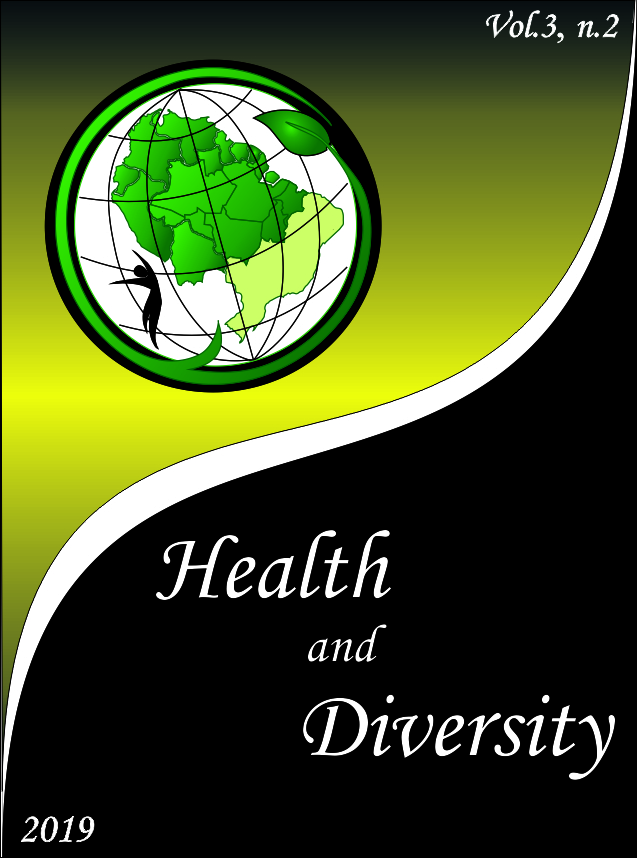Project-based learning: video game development as a tool to integrate ecology, genetics, evolution and informatics
DOI:
https://doi.org/10.18227/hd.v3i2.7440Palabras clave:
Interdisciplinaridade, biologia, aprendizado ativo, aprendizado centrado no estudanteResumen
Introduction: Active, student-centered learning encourages the development of 21st century skills and competences. Many of them encourage, in addition to autonomy, interdisciplinarity. Therefore, the participation of students in the creation and not only the stimulation of the use of technologies is extremely relevant. Considering the importance of multidisciplinarity that must envolve the learning process, new approaches such as Project Based-Learning have been developed, seeking greater involvement of the students in learning-related decisions. Objective: Aiming the interdisciplinarity that the integrated educational system requires, the purpose of this study was to analyze the development of games as an integration tool, between biology and computing area. The games have been developed along with the subjects of Entrepreneurship and Practical Projects III. Methods: Classes have been held so that high school students could grasp the contents of Evolution, Genetics and Ecology, which would be the central themes of the games. Results: Groups who have chosen Evolution to work with had greater difficulty in understanding the contente whereas those who have worked with Ecology and Genetics outdid the formers. The Game Maker program stood out being the most used tool for the game’s making process. Conclusion: The acceptance of the project by the students leads to the conclusion that innovative methodologies such as project-based learning is a great tool in education, so that the groups could be more involved in class and the subjects could be linked together.
Descargas
Citas
ARANHA, Maria Lúcia Arruda. Filosofia da educação. SP. Moderna, 1996.
CARBONI, P. B.; SOARES, M. A. M. A genética molecular no ensino médio, 2007. Disponível: . Acesso: 13 de outubro de 2019.
FAZENDA, Ivani Catarina Arantes. Didática e interdisciplinaridade. Papirus Editora, 2008.
GRIFFITHS, Mark. The educational benefits of videogames. Health And Education, Exeter, v. 20, n. 3, p.47-51, nov. 2002.
HAAMBOKOMA, Christopher. Nature and causes of learning difficulties in genetics at high school level in Zambia. Journal of International Development and Cooperation, v. 13, n. 1, p. 1-9, 2007.
JUPIASSU, Hilton. O espírito interdisciplinar. Cadernos EBAPE. BR, v. 4, n. 3, p. 01-09, 2006.
MARQUES, F. S.; SALOMÃO, S. R. Ensino de biologia e atividades lúdicas: o jogo de tabuleiro conectando conteúdos de evolução e ecologia no ensino médio. Sebnbio: Associação Brasileira do Ensino de Biologia, Rio de Janeiro, v. 7, n. 7, p.2072-2084, out. 2014.
MELO, J.; CARMO, E. M. Investigações sobre o ensino de genética e biologia molecular no ensino médio brasileiro: reflexões sobre as publicações científicas. Ciência & Educação (Bauru), v. 15, n. 3, p. 593-611, 2009.
MELO, M. V.O., ARAÚJO, W. S., OLIVEIRA, A. C., & SOARES, T. N. Jogo galápagos: a extinção e irradiação de espécies na construção da diversidade biológica. Genética na Escola, Samambaia, v. 3, n. 1, p.49- 57, abr. 2008.
MIZUTANI, Thais Tiemi. As dificuldades encontradas pelos professores e alunos no processo de ensino e aprendizagem de Ecologia em uma escola pública da cidade de São Paulo. 2010. 41 f. Monografia (Especialização) – Curso de Ciências Biológicas, Universidade Presbiteriana Mackenzie, São Paulo, 2010.
MOURA, J. C. S.; SANTANA, C. C. S. A evolução humana sob a ótica do professor do ensino médio. Metáfora Educacional, n. 13, p. 93-108, 2012.
NEI, Masatoshi. Molecular population genetics and evolution. Houston: Under The General Editorship Of A. Neuberger London And E. L. Tatum New York, p.285, 1975.
NOBRE, J. C. S., LOUBACH, D. S., DA CUNHA, A. M., & DIAS, L. A. V. Aprendizagem Baseada em Projeto (Project-Based Learning – PBL) aplicada a software embarcado e de tempo real. XVII Simpósio Brasileiro de Informática na Educação - Sbie - Unb/ucb, São José dos Campos, p.258-267, set. 2006. Anual.
OLEQUES, L., BARTHOLOMEI-SANTOS, M. L., NASCIMENTO, L., & TEMP, D. S. Entendendo a Seleção Natural. Genética na Escola, Ribeirão Preto, v. 7, n. 2, p.78- 87, nov. 2012.
OMOTO, Charlotte K. Learning Mendelian genetics through a simple coin toss game. The American Biology Teacher, v. 60, n. 8, p. 608-612, 1998.
PARANÁ. MIRIAM ABUCARMA. Aplicações de recursos e tecnologias na educação de jovens e adultos: aberrações cromossômicas – Causas e Conseqüências. O Professor PDE e Os Desafios da Escola Pública Paranaense, Cascavel, v. 1, n. 1, p.1-25, set. 2009. Disponível em: <http://www.diaadiaeducacao.pr.gov.br/portals/cadernospde/pdebusca/producoes_pde/2009_unioeste_biologia_artigo_miriam_abucarma.pdf>. Acesso em: 13 de outubro de 2019.
PASSMORE, Cynthia; StEWART, Jim. A modeling approach to teaching evolutionary biology in high schools. Journal of Research in Science Teaching: The Official Journal of the National Association for Research in Science Teaching, v. 39, n. 3, p. 185-204, 2002.
QUEIROZ, Heverton Santos. Desenvolvendo jogos com o Game Maker. 2012. 74 f. TCC (Graduação) – Curso de Ciência da Computação, Departamento de Ciências Exatas, Universidade Estadual Do sudoeste da Bahía, Vitória da Conquista, 2012.
SANTOS, A. L.P.; MOITA, F. M. G. S. C. Os jogos como contextos curriculares: um estudo das construções de gênero no “The SIMS”. In: SOUZA, Robson Pequeno de; MOITA, Filomena Mª Gonçalves da Silva Cordeiro; CARVALHO, Ana Beatriz Gomes (Org.). Tecnologias digitais na Educação. Campina Grande: Eduepb, 2011. p. 105-129.
SILVÉRIO, L. E. R.; MAEStRELLI, S. R. P. O conceito de gene como obstáculo pedagógico: Repercussões no ensino e aprendizagem da genética no ensino escolar. In: ENCONTRO REGIONAL DE BIOLOGIA DO SUL, 5., 2011, Londrina. Anais do V encontro regional de Biologia. Londrina, 2011. p. 1 - 8.
TIDON, R.; LEWONTIN, R. C. Teaching evolutionary biology. Genetics and molecular biology, v. 27, n. 1, p. 124-131, 2004.
TOPCU, M. S.; SAHIN-PEKMEZ, E. Turkish Middle School Students' Difficulties in Learning Genetics Concepts. Journal of Turkish Science Education (TUSED), v. 6, n. 2, 2009.
Descargas
Publicado
Cómo citar
Número
Sección
Licencia

Esta obra está bajo una licencia internacional Creative Commons Atribución-NoComercial-SinDerivadas 4.0.

Este obra está licenciado com uma Licença Creative Commons Atribuição 4.0 Internacional.







